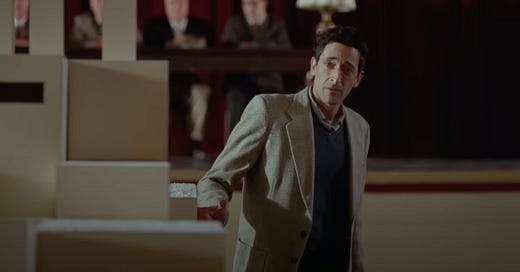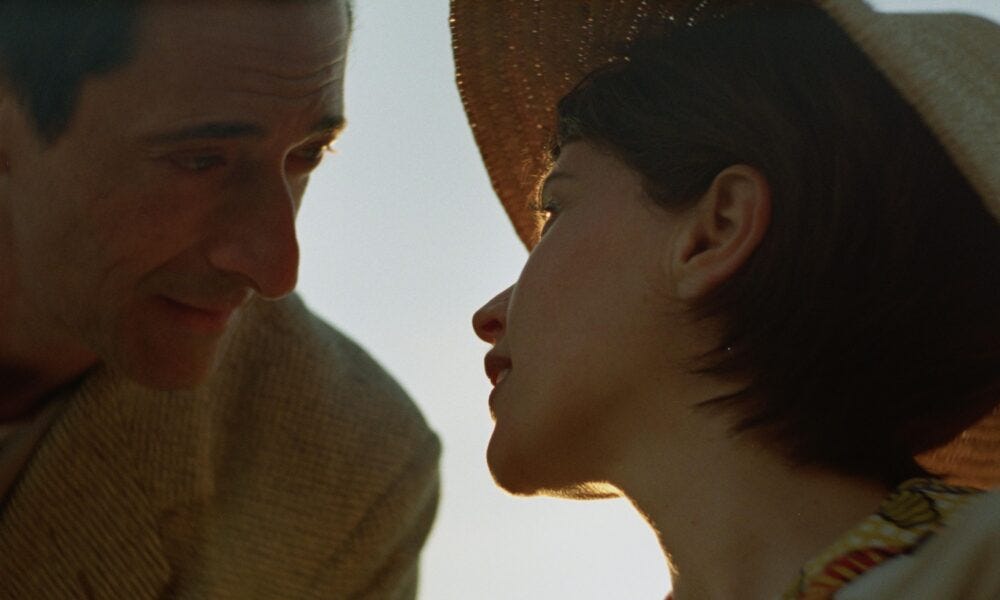(Brookstreet Pictures / A24)
WARNING: This review includes spoilers.
Brady Corbet’s highly anticipated historical epic, The Brutalist, is an amalgamation of many things. If you’re like me, an avid, lifelong movie lover, you might be reminded of other films with similar themes while watching it. I kept thinking of famous movies like P.T. Anderson’s There Will be Blood (2007), Roman Polanski’s The Pianist (2002), King Vidor’s The Fountainhead (1949), Steven Spielberg’s Munich (2005), both of Francis Ford Coppola’s The Godfather Part II (1974) and Megalopolis (2024). Corbet has been compared to some of these very filmmakers in praised reviews of his new picture, and it makes sense. He’s primarily an independent filmmaker who makes the very most of the small budgets he’s given, essentially throwing everything but the kitchen sink into the film. Whether it actually works may depend on the viewer.
Adrien Brody stars as László Tóth, a Jewish Hungarian who moves to Philadelphia, PA, in 1947 following The Holocaust and makes a name for himself as the head architect of affluent, self-made industrialist Harrison Van Buren (Guy Pearce). Felicity Jones co-stars as László’s beloved, recently wheelchair bound wife, Erzsébet, who joins him in America in 1953, along with their young niece Zsófia (Raffey Cassidy). Alessandro Nivola and Emma Laird play László’s cousin Attila and his American wife Audrey, who help him ease into life in the US; while Joe Alwyn and Stacy Martin play Harrison’s spoiled, grown children Harry and Maggie.
The Brutalist is co-written by Corbet and his wife, Mona Fastvold, who also co-wrote the director’s previous films The Childhood of a Leader (2015) and Vox Lux (2018). Their current release has to be one of the most ambitious films to come out of 2024, and is essentially Corbet rejecting the concept of ‘less is more’ for a whopping 215 minute runtime. This seems to be working for many critics and fans, and in theory, it should work for me, as someone who is already a fan of classic epics. Corbet is a former teen actor who is now one of the more visually interesting filmmakers of his generation and clearly knows his stuff regarding the camera. And yet, something isn’t clicking with me here. The tone, the narrative, and character developments all feel almost amateurish despite the technical achievements. It’s so close to being an instant classic but instead feels like the most impressive student film ever made. There are so many arcs and side plots, and they’re all presented bombastically shallow, whether intentionally or not. Prejudice, greed, assault, addiction, infidelity, politics. In many ways, The Brutalist really is the prestige, twin film of Megalopolis. Both bite off more than they can chew and leave the audience perplexed. But while Megalopolis felt like an accidental Randian farce, The Brutalist feels naively Randian as a drama.
(Brookstreet Pictures / A24)
The first two hours seem to largely be considered the stronger half of the film, where we see the traditional mid-20th century immigration experience, with László reluctant to abandon his Jewish and Hungarian roots to fit into Philadelphia; unlike his cousin, who has embraced anglicizing his surname and converting to his wife’s Catholic religion. László deals with bigotry and artistic ignorance from his colleagues and neighbors, but as a character, he’s actually hard to root for. We spend the whole first half hearing about how wonderful and in love he is with Erzsébet, while at the same time see him engage in casual foreplay [all he’ll allow himself to participate in] with three different women throughout the film. I assume this is supposed to be some kind of realism that even devoted husbands sometimes can’t reject temptation, but it’s mostly off putting and pointless. None of the sex works in the film, save for a love scene between László and Erzsébet during the third act, and even then, the act is instigated by both of them being high on heroin. There’s a rape scene in the second half that doesn’t feel earned and cheapens the build up to the story’s climax. Corbet & Fastvold’s commentary on the myth of the American Dream and failed capitalism is stale and was better executed in There Will be Blood. What is interesting is how The Brutalist is about the Jewish-American experience, yet is written and directed by two gentiles [Corbet only claiming recently he’s “very, very distantly Jewish”]. ‘Jewish-face’ comes up occasionally as an argument when secular actors are cast as Jewish characters, so it’s surprising I haven’t seen any discussions on the inverse of it here, on top of castmates Jones and Cassidy not being Jewish in real life. It’s rare to find a gentile directed film about Judaism, and this one is so inherently about the topic that it becomes a little uncomfortable in some scenes. The focus on the Tóths’ religious practices and initial rejection of Israel feel like an afterthought in between everything else going on in the movie, and the conclusion to that subplot nearly comes off like Corbet speaking on behalf of a culture he’s not actually a part of. Artists are allowed to portray characters outside of their own ancestry, but a Jewish director like Spielberg or Polanski would have spent more time dissecting the subject with nuance, instead of coming across like someone who just reads the news a lot.
Though it sounds like I’m coming down on The Brutalist with this extra long review, there are some parts I did like about the film. I thought Brody’s performance was exceptional and a great companion piece for his Oscar winning performance in Polanski’s own Holocaust set picture, The Pianist. Jones and Pearce are also good, and Alwyn might be my favorite part of the cast, proving he not only has solid taste in choosing projects, but can actually hold his own in scenes. There were a lot of reports in film publications on the retro uses of an intermission at the 105 minute mark, Lol Crawley’s cinematography featuring both VistaVision and 35mm film in all its film grainy glory, unique opening and closing credits that go across the screen horizontally instead of vertically. The pacing is impressively smooth and doesn’t drag at any time. All of these elements work well and are appropriately praised. But these are just a handful of things that only make up a portion of the final product, which might actually be my most underwhelming film of 2024 cinema after weeks of looking forward to it. A stunning prologue promises insights into both Judaism and brutalist architecture for the next three and a half hours, but ultimately concludes as the cinematic equivalent of a Wikipedia excerpt.
[NOTE: This review was written before the reports of AI programs being controversially used during post-production of The Brutalist were published last weekend; specifically on the dialects for scenes featuring Hungarian language and some reference art for sketches near the end of the film. While disappointing, the Hungarian dialogue makes up roughly less than 10 minutes of the film, and I don’t think we should completely disregard Brody’s or Jones’ performances in this tiny of a context. Particularly when some performances in movie musicals traditionally have ghost dubbing on the singing vocals. The AI use on the reference art, especially when you consider the film’s protagonist and message, is a bit more damning.]





